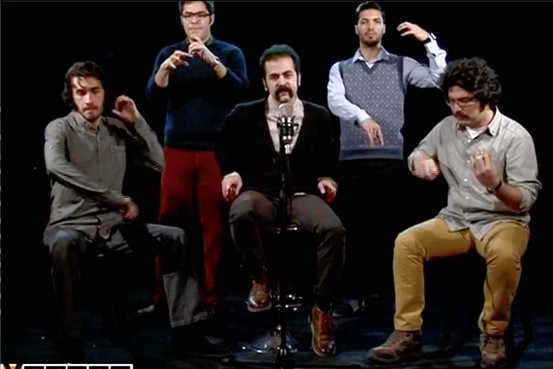There, for all to see, was a performance by Avaye Parsian, a traditional Persian music band. It was the first time a full band had played instruments on state TV since 1979, when the Iranian revolution ushered in an arch-conservative Islamist country that deemed such displays too irreverent for television.
Before the day was out there was more: The Pallett, a popular contemporary music band, appeared on a late-night show called Radio 7 in an equally daring way for a jazz or rock band.
They didn't actually play instruments, but they did exuberantly pretend to�air band style.
[caption id="" align="alignnone" width="553"]
 The Iranian band Pallett pretend to play their instruments on Iranian state television program Radio 7 as ban on musical performances eases. Radio 7[/caption]
The Iranian band Pallett pretend to play their instruments on Iranian state television program Radio 7 as ban on musical performances eases. Radio 7[/caption]That appearance is becoming something of a Beatles-on-Ed-Sullivan moment for contemporary music in Iran's tightly controlled public sphere. Before the taped performance ended, The Pallett's page on�Facebook�FB�+3.47%��among the social media banned in Iran but widely used by everyone from the president on down�lit up with comments and debate.
Reactions to the TV appearances reflected the hopes many Iranians feel after the election of a new president, Hasan Rouhani, in June. He succeeded the bellicose�Mahmoud Ahmadinejad.
In subtle ways, Iranians said Mr. Rouhani's government has tried to ease the most zealous enforcement of Islamic codes and create space for more personal expression in public.
Some viewers were taken aback by the musical broadcasts, others thrilled.
Watch scenes of a January performance by Avaye Parsian, a traditional Persian-music group. Their appearance was the first time a full band had played musical instruments on state TV since the Iranian Revolution in 1979.
"I thought it was courageous," said Nahal Mahzouf, 28, translator and screenwriter.
Mr. Rouhani has yet to come through on big-ticket campaign promises such as releasing hundreds of activists still detained after the protests over disputed presidential elections more than four years ago. Two opposition presidential candidates from that race� Mir Hussain Mousavi and Mehdi Karroubi �remain under house arrest. Nor has the president managed to legalize social-media sites such as Facebook and�Twitter�TWTR�+8.63%�as he talked about during the election�even though he is an active user himself. But Mr. Rouhani has talked about expanding the boundaries for personal freedoms. That has created hope and support from some�anger, fear and opposition among others.
His new culture minister, Ali Jannati, is the son of one of the Islamic Republic's most powerful hard-line clerics. But he, nonetheless, is widely credited with helping promote the new atmosphere of tentative experimentation and cautious envelope-pushing. Building on Mr. Rouhani's small steps will be one important measure of his ability to maintain popular support while negotiating the removal of sanctions in return for reining in Iran's nuclear program.
Members of Avaye Parsian and The Pallett said they never intended to create a fuss, much less a Pussy Riot-style protest.
Saman Alipour, the 25-year-old founder of Avaye Parsian, said the band wasn't even aware they would be shown on television until their live performance was over. Mr. Alipour, who plays the Tar, a strummed instrument featured mainly in traditional Persian music, said they had assumed it would be the usual television appearance where they played in the studio while nature photos and abstract designs are shown on TV.
The producer who decided to show Avaye Parsian declined to comment. In the furor of newspaper headlines and online debate that erupted after the show, he was quoted in one online news outlet saying he showed the band by mistake.
"We received both positive and negative feedback," said Mr. Alipour.
"But we're hopeful." He said the band, which he formed when he was 16 years old, has received a raft of new invitations to play.
Mansour Zabatan, the 42-year-old producer of Radio 7, where The Pallett made its splash that day, said having the group pretend to play instruments was an attempt to stay within the rules yet still give young fans what they want.
That is in line with the show's mission, as he sees it, of bridging massive gulfs between young and old, conservative and liberal, sacred and profane.
"We want to help the two sides talk to each other," he said.
He worked with the band to make the appearance more about having fun with the music than making fun of restrictions on instruments, he said.
Members of the The Pallett said they just wanted to appear together as a band to keep the focus on the their music.
Aside from regular concerts in Iran, the group did a short European tour in October and is hoping to arrange performances in U.S. cities this fall.
The huge reaction their appearance created has left them equal parts excited and nervous.
"We're still getting reactions," said Rouzbeh Esfandarmaz, 28, a clarinetist and founder of The Pallett.
"We maybe wanted to toss a tiny pebble in the pond to make some ripples, but it has turned out to be a 10,000 pound boulder."
By The Wall Street Journal
The Iran Project is not responsible for the content of quoted articles











